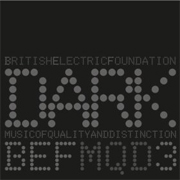After the trailblazing analogue electronic art-pop of The Human League’s Reproduction and Travelogue albums, released in 1979 and 1980 respectively, it’s often tempting to imagine what the third album by that pre-Dare line-up would have sounded like, had founding member Martyn Ware not been unceremoniously booted out of his own band at the tail end of 1980. With League co-founder Ian Craig Marsh in tow, the sonic shards of what might have been The League’s third album formed the basis of the duo’s Heaven 17 work and their B.E.F (British Electric Foundation) production project. Fueled by resentment at their unexpected League exit and a wilful determination to succeed, Ware and Marsh poured their energies into expanding the pioneering template that had underpinned that infectious early League sound.
The fecund creative flow during the recording of Heaven 17’s first album Penthouse & Pavement in 1981 saw them working at a frenetic pace – according to Ware, the ideas during those sessions couldn’t come fast enough – but he and Marsh had begun to find their feet as producers, too. A hot artistic streak had already seen them release, as B.E.F, 1981’s Music For Stowaways (stark, filmic electronic instrumentals, later repackaged as Music For Listening To), and that same year, as well as Penthouse & Pavement, their creative spark also spawned Music Of Quality And Distinction, Volume 1, B.E.F’s first album proper.
While B.E.F’s ethos allowed great guest singers license to imbue established songs with their own vocal tics and inflections, Marsh and Ware’s ideas, electronic treatments and production know-how were just as crucial in making that inaugural ‘official’ B.E.F album stand out. As Ware himself declared in an interview on this very site, it was "a manifesto for electronic music."
You could argue that, for listeners, part of the attraction is familiarity with the original material, but there’s a frisson of something truly empyreal – an element of futuristic portent, perhaps – that lends the Volume 1 covers a certain gravitas, particularly on the robo-funk of ‘The Secret Life Of Arabia’, featuring Billy Mackenzie’s spine-tingling warble, and Glenn Gregory’s majestic, stripped back renditions of ‘Perfect Day’ and the wonderfully eerie ‘Wichita Lineman’. Paula Yates, Paul Jones and Sandie Shaw took pretty well to B.E.F’s machine-backed arrangements, too. Volume 2, released in 1991, felt rather more anodyne and much less essential, but had its moments: Lalah Hathaway adds soul oomph to Sly & The Family Stone’s funk classic ‘A Family Affair’, while Green Gartside’s dependable sugary falsetto elevates Stevie Wonder’s ‘I Don’t Know Why I Love You’ to new highs.
Now, with Marsh no longer part of the B.E.F/Heaven 17 equation (having departed in 2007), Ware, on the BEF front at least, has struck out on his own. Inspired by The Human League’s shiver-inducing cover of The Righteous Brothers’ ‘You’ve Lost That Lovin’ Feeling’ (adapted by Ware, it features Phil Oakey crooning lugubriously atop beautifully stark bleeps), Dark purports to be about, well, "dark reinterpretations" of established tracks. Nothing here quite captures the seductive otherworldliness of that inspired League cover, but there’s still a surfeit of beguiling, redemptive moments to wallow in.
Bill Withers’ ‘Same Love (That Made Me Laugh)’ is brilliantly vamped up by a Moroder-esque backbeat, while Noisettes’ Shingai Shoniwa adds a husky urgency to The Beach Boys’ ‘God Only Knows’. And, in a grizzlier, lower range than usual, Boy George is surprisingly effective (if a touch predictable) doing ‘Make Up’, Lou Reed’s well-worn paean to eyeliner and ‘coming out’. Glenn Gregory’s twinkly late night piano-bar baritone on The Associates’ ‘Party Fears Two’ is curiously resonant, too; and Russian singer Max Pokvrosky’s camp Euro-disco take on Abba’s ‘The Day Before You Came’ is an unexpected scream.
Although it very occasionally jars – as with Andy Bell’s karaoke-ish pastiche of Kate Bush’s ‘Breathing’, for instance – Dark is a properly worthy successor to its 1981 progenitor. It’s to Ware’s credit that these thrilling, noir-ish torch songs exceed expectations and, on the whole, make for pretty essential late night listening.


